2012 PEUGEOT 3008 warning
[x] Cancel search: warningPage 29 of 328
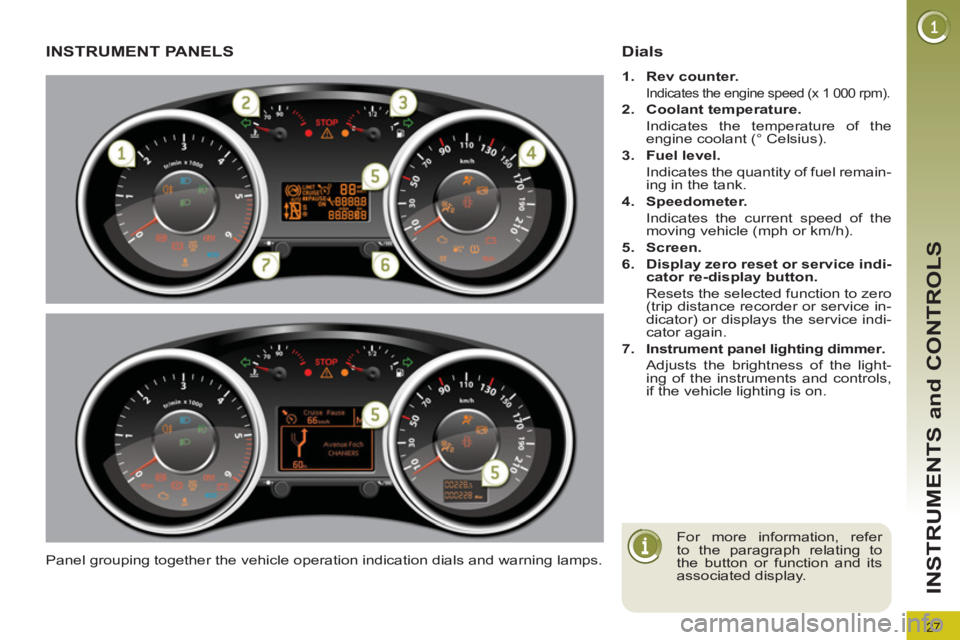
27
INSTRUMENTS and CONTROLS
INSTRUMENT PANELS
Panel grouping together the vehicle operation indication dials and warning lamps.
Dials
1.
Rev counter.
Indicates the engine speed (x 1 000 rpm).
2.
Coolant temperature.
Indicates the temperature of the
engine coolant (° Celsius).
3.
Fuel level.
Indicates the quantity of fuel remain-
ing in the tank.
4.
Speedometer.
Indicates the current speed of the
moving vehicle (mph or km/h).
5.
Screen.
6.
Display zero reset or service indi-
cator re-display button.
Resets the selected function to zero
(trip distance recorder or service in-
dicator) or displays the service indi-
cator again.
7.
Instrument panel lighting
dimmer
.
Adjusts the brightness of the light-
ing of the instruments and controls,
if the vehicle lighting is on.
For more information, refer
to the paragraph relating to
the button or function and its
associated display.
Page 30 of 328
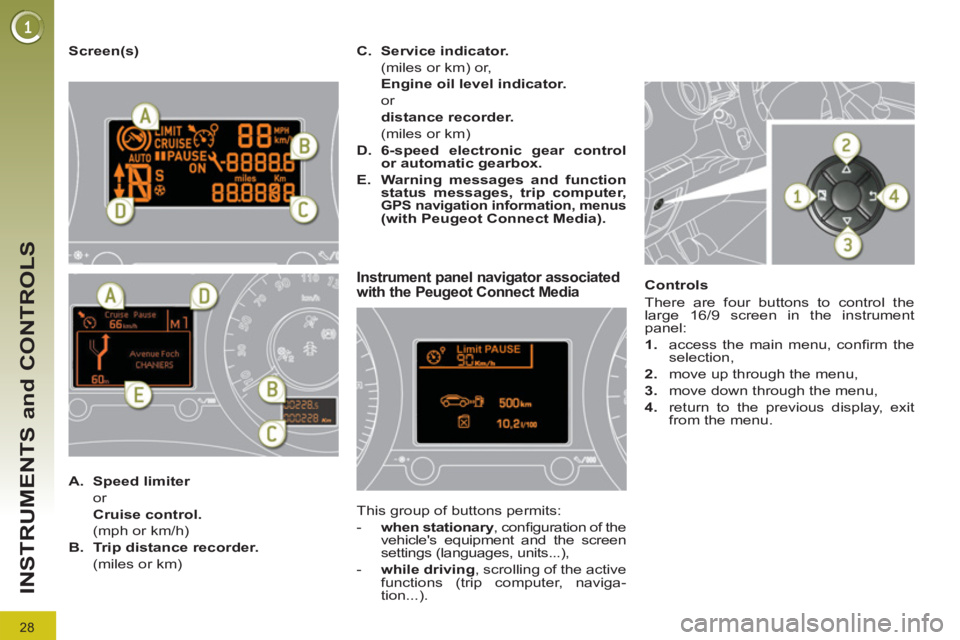
28
INSTRUMENTS and CONTROLS
Screen(s)
Instrument panel navigator associated
with the Peugeot Connect Media
This group of buttons permits:
- when stationary
, confi guration of the
vehicle's equipment and the screen
settings (languages, units...),
- while driving
, scrolling of the active
functions (trip computer, naviga-
tion...).
Controls
There are four buttons to control the
large 16/9 screen in the instrument
panel:
1.
access the main menu, confi rm the
selection,
2.
move up through the menu,
3.
move down through the menu,
4.
return to the previous display, exit
from the menu.
A.
Speed limiter
or
Cruise control.
(mph or km/h)
B.
Trip distance recorder.
(miles or km)
C.
Service indicator.
(miles or km) or,
Engine oil level indicator.
or
distance recorder.
(miles or km)
D.
6-speed electronic gear control
or automatic gearbox.
E.
Warning messages and function
status messages, trip computer,
GPS navigation information, menus (with Peugeot Connect Media).
Page 31 of 328

29
INSTRUMENTS and CONTROLS
Vehicle parameters
This menu allows you to activate or
deactivate certain driving and comfort
equipment (according to country):
- wiper linked with reverse gear (refer
to the "Visibility" section),
- selective unlocking (refer to the "Ac-
cess" section),
- guide-me-home and welcome light-
ing (refer to the "Visibility" section),
- interior mood lighting (refer to the
"Visibility" section),
- daytime running lamps (refer to the
"Visibility" section),
- directional headlamps (refer to the
"Visibility" section),
- automatic or manual parking brake
(refer to the "Driving" section).
Choice of units
This menu allows you to select the units:
temperature (°Celsius or °Fahrenheit)
and fuel consumption (l/100 km, mpg or
km/l).
Choice of language
This menu allows you to select the
display language: Deutsch, English,
Espanol, Français, Italiano, Nederlands,
Portugues, Türkçe * .
The main menu and its asso-
ciated functions can only be
accessed when stationary, via
buttons 1
to 4
.
A message appears on the screen,
above a certain speed threshold, in-
dicating that the main menu cannot
be displayed.
The trip computer displays can only
be accessed while driving, via but-
tons 2
and 3
(refer to the "Trip com-
puter" paragraph).
Main menu
�)
Press button 1
for access to the
main menu and select one of the fol-
lowing functions:
- "Vehicle parameters",
- "Choice of language",
- "Choice of units".
�)
Press button 2
or 3
to move in the
screen.
�)
Press button 1
again to confi rm the
selection.
*
According to country.
Indicator and warning lamps
Visual indicators informing the driver
that a system is in operation (operation
or deactivation indicator lamps) or of the
occurrence of a fault (warning lamp).
When the ignition is switched on
Certain warning lamps come on for a
few seconds when the vehicle's ignition
is switched on.
When the engine is started, these same
warning lamps should go off.
If they remain on, before moving off, refer to the
information on the warning lamp concerned.
Associated warnings
The illumination of certain warning
lamps may be accompanied by an au-
dible signal and a message in the multi-
function screen.
The warning lamps may come
on continuously (fi xed) or
fl ash.
Certain warning lamps may come on
in two different modes. Only by re-
lating the type of illumination to the
operating status of the vehicle can
it be ascertained whether the situa-
tion is normal or whether a fault has
occurred.
Page 32 of 328

30
INSTRUMENTS and CONTROLS
Operation indicator lamps
If one of the following indicator lamps comes on, this confi rms that the corresponding system has come into operation.
Warning lamp
is on
Cause
Action/Observations
Left-hand
direction
indicato
r
fl ashing
with buzzer. The lighting stalk is pushed
down.
Right-hand
direction
indicator
fl ashing
with buzzer. The lighting stalk is pushed
up.
Sidelamps
fi xed. The lighting stalk is in the
"Sidelamps" position.
Dipped beam
headlamps
fi xed. The lighting stalk is in the
"Dipped beam headlamps"
position.
Main beam
headlamps
fi xed. The lighting stalk is pulled
towards you. Pull the stalk to return to dipped beam
headlamps.
Front
foglamps
fi xed. The front foglamps are
switched on. Turn the ring on the stalk rearwards twice to
switch off the front foglamps.
Rear
foglamps
fi xed. The rear foglamps are
switched on. Turn the ring on the stalk rearwards to switch off
the rear foglamps.
Page 33 of 328
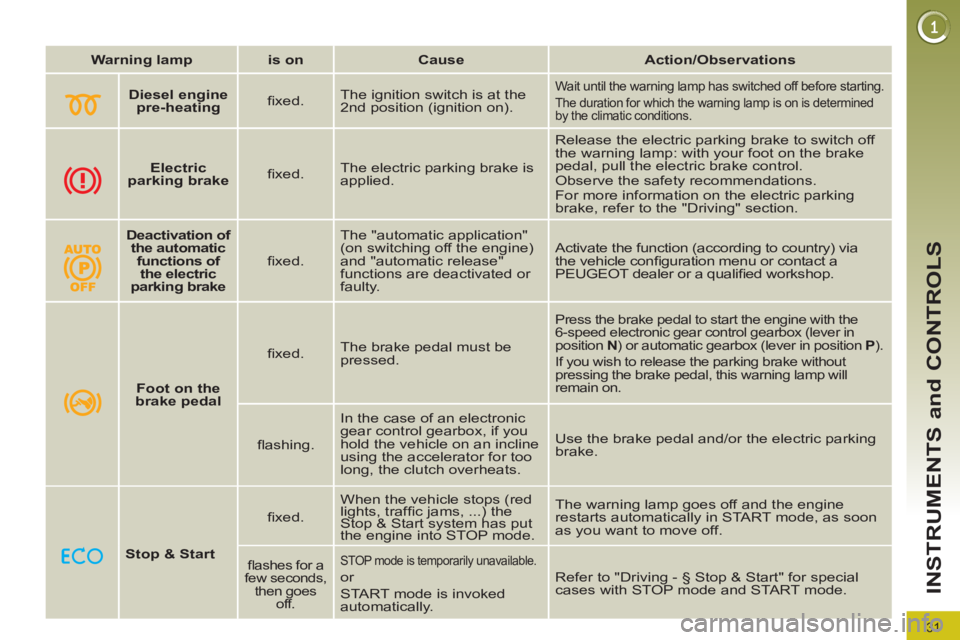
31
INSTRUMENTS and CONTROLS
Warning lamp
is on
Cause
Action/Observations
Diesel engine
pre-heating
fi xed. The ignition switch is at the
2nd position (ignition on). Wait until the warning lamp has switched off before starting.
The duration for which the warning lamp is on is determined
by the climatic conditions.
Electric
parking brake
fi xed. The electric parking brake is
applied. Release the electric parking brake to switch off
the warning lamp: with your foot on the brake
pedal, pull the electric brake control.
Observe the safety recommendations.
For more information on the electric parking
brake, refer to the "Driving" section.
Deactivation of
the automatic
functions of
the electric
parking brake
fi xed. The "automatic application"
(on switching off the engine)
and "automatic release"
functions are deactivated or
faulty. Activate the function (according to country) via
the vehicle confi guration menu or contact a
PEUGEOT dealer or a qualifi ed workshop.
Foot on the
brake pedal
fi xed. The brake pedal must be
pressed.
Press the brake pedal to start the engine with the
6-speed electronic gear control gearbox (lever in
position N
) or automatic gearbox (lever in position P
).
If you wish to release the parking brake without
pressing the brake pedal, this warning lamp will
remain on.
fl ashing. In the case of an electronic
gear control gearbox, if you
hold the vehicle on an incline
using the accelerator for too
long, the clutch overheats. Use the brake pedal and/or the electric parking
brake.
Stop & Start
fi xed. When the vehicle stops (red
lights, traffi c jams, ...) the
Stop & Start system has put
the engine into STOP mode. The warning lamp goes off and the engine
restarts automatically in START mode, as soon
as you want to move off.
fl ashes for a
few seconds,
then goes
off.
STOP mode is temporarily unavailable.
or
START mode is invoked
automatically. Refer to "Driving - § Stop & Start" for special
cases with STOP mode and START mode.
Page 34 of 328
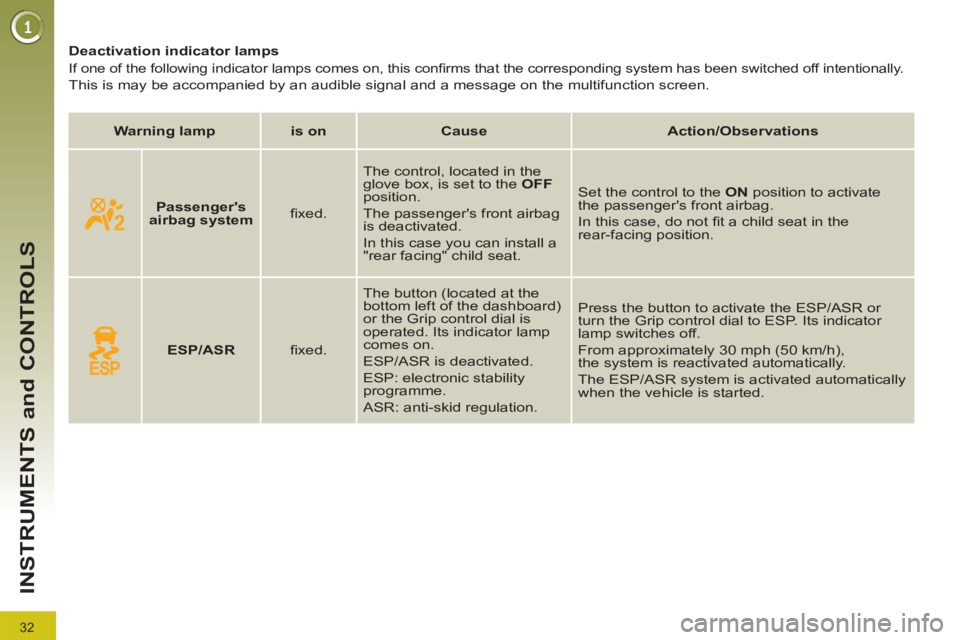
32
INSTRUMENTS and CONTROLS
Deactivation indicator lamps
If one of the following indicator lamps comes on, this confi rms that the corresponding system has been switched off intentionally.
This is may be accompanied by an audible signal and a message on the multifunction screen.
Warning lamp
is on
Cause
Action/Observations
Passenger's
airbag system
fi xed. The control, located in the
glove box, is set to the OFF
position.
The passenger's front airbag
is deactivated.
In this case you can install a
"rear facing" child seat. Set the control to the ON
position to activate
the passenger's front airbag.
In this case, do not fi t a child seat in the
rear-facing position.
ESP/ASR
fi xed. The button (located at the
bottom left of the dashboard)
or the Grip control dial is
operated. Its indicator lamp
comes on.
ESP/ASR is deactivated.
ESP: electronic stability
programme.
ASR: anti-skid regulation. Press the button to activate the ESP/ASR or
turn the Grip control dial to ESP. Its indicator
lamp switches off.
From approximately 30 mph (50 km/h),
the system is reactivated automatically.
The ESP/ASR system is activated automatically
when the vehicle is started.
Page 35 of 328
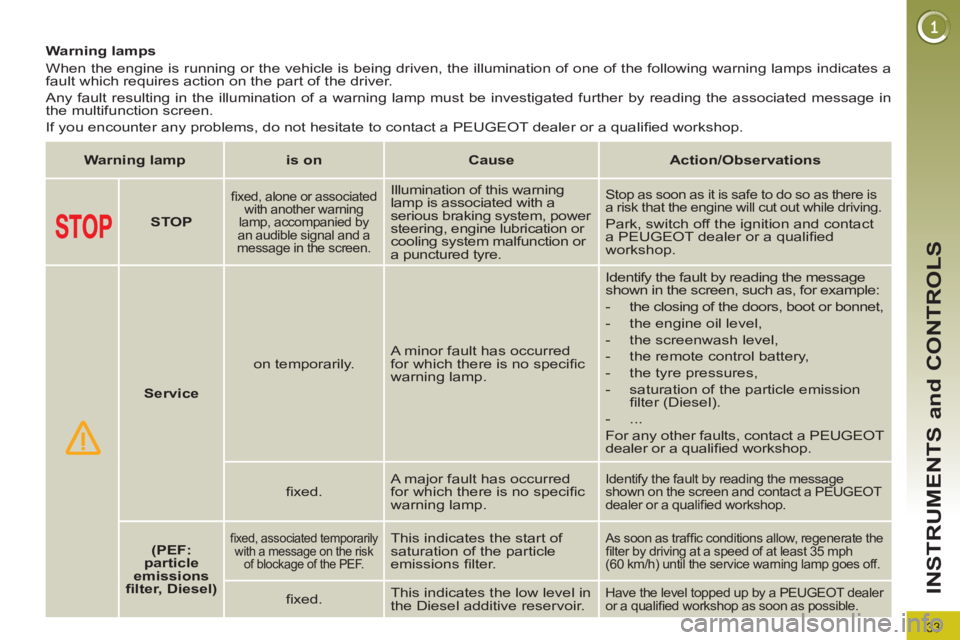
33
INSTRUMENTS and CONTROLS
Warning lamps
When the engine is running or the vehicle is being driven, the illumination of one of the following warning lamps indicates a
fault which requires action on the part of the driver.
Any fault resulting in the illumination of a warning lamp must be investigated further by reading the associated message in
the multifunction screen.
If you encounter any problems, do not hesitate to contact a PEUGEOT dealer or a qualifi ed workshop.
Warning lamp
is on
Cause
Action/Observations
STOP
fi xed, alone or associated
with another warning
lamp, accompanied by
an audible signal and a
message in the screen.
Illumination of this warning
lamp is associated with a
serious braking system, power
steering, engine lubrication or
cooling system malfunction or
a punctured tyre. Stop as soon as it is safe to do so as there is
a risk that the engine will cut out while driving.
Park, switch off the ignition and contact
a PEUGEOT dealer or a qualifi ed
workshop.
Service
on temporarily. A minor fault has occurred
for which there is no specifi c
warning lamp. Identify the fault by reading the message
shown in the screen, such as, for example:
- the closing of the doors, boot or bonnet,
- the engine oil level,
- the screenwash level,
- the remote control battery,
- the tyre pressures,
- saturation of the particle emission
fi lter (Diesel).
- ...
For any other faults, contact a PEUGEOT
dealer or a qualifi ed workshop.
fi xed. A major fault has occurred
for which there is no specifi c
warning lamp.
Identify the fault by reading the message
shown on the screen and contact a PEUGEOT
dealer or a qualifi ed workshop.
(PEF:
particle
emissions
fi lter, Diesel)
fi xed, associated temporarily
with a message on the risk
of blockage of the PEF.
This indicates the start of
saturation of the particle
emissions fi lter.
As soon as traffi c conditions allow, regenerate the
fi lter by driving at a speed of at least 35 mph
(60 km/h) until the service warning lamp goes off.
fi xed. This indicates the low level in
the Diesel additive reservoir. Have the level topped up by a PEUGEOT dealer
or a qualifi ed workshop as soon as possible.
Page 36 of 328
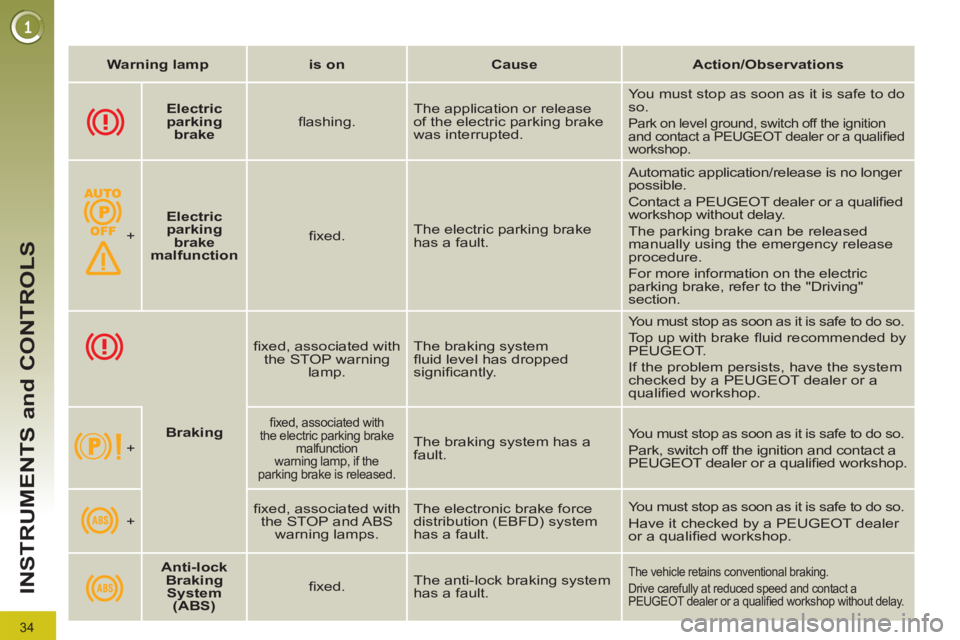
34
INSTRUMENTS and CONTROLS
Warning lamp
is on
Cause
Action/Observations
Electric
parking
brake
fl ashing. The application or release
of the electric parking brake
was interrupted. You must stop as soon as it is safe to do
so. Park on level ground, switch off the ignition
and contact a PEUGEOT dealer or a qualifi ed
workshop.
+
Electric
parking
brake
malfunction
fi xed. The electric parking brake
has a fault. Automatic application/release is no longer
possible.
Contact a PEUGEOT dealer or a qualifi ed
workshop without delay.
The parking brake can be released
manually using the emergency release
procedure.
For more information on the electric
parking brake, refer to the "Driving"
section.
Braking
fi xed, associated with
the STOP warning
lamp. The braking system
fl uid level has dropped
signifi cantly.
You must stop as soon as it is safe to do so.
Top up with brake fl uid recommended by
PEUGEOT.
If the problem persists, have the system
checked by a PEUGEOT dealer or a
qualifi ed workshop.
+
fi xed, associated with
the electric parking brake
malfunction
warning lamp, if the
parking brake is released.
The braking system has a
fault. You must stop as soon as it is safe to do so.
Park, switch off the ignition and contact a
PEUGEOT dealer or a qualifi ed workshop.
+
fi xed, associated with
the STOP and ABS
warning lamps. The electronic brake force
distribution (EBFD) system
has a fault.
You must stop as soon as it is safe to do so.
Have it checked by a PEUGEOT dealer
or a qualifi ed workshop.
Anti-lock
Braking
System
(ABS)
fi xed. The anti-lock braking system
has a fault. The vehicle retains conventional braking.
Drive carefully at reduced speed and contact a
PEUGEOT dealer or a qualifi ed workshop without delay.